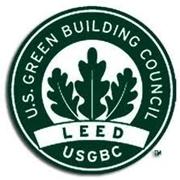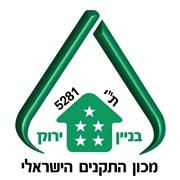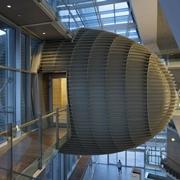Green Building Certification



The Porter School for Environmental Studies (PSES) Building was designed to be the first building in Israel to qualify for LEED Platinum status – the highest accreditation of the LEED certification system, developed by the U.S. Green Building Council (USGBC). In Addition, it is intended to be the first structure to be awarded diamond ranking of the new Israeli Green Building Standard #5281, under the 'Education Institutions' category.
What are these certifications and what do they mean?
The American LEED Certification
LEED (Leadership in Energy and Environmental Design) is one of the main rating systems developed to support the growing global trend of green building. Designed to measure and grade a structure’s long-term sustainability and environmental friendliness, these rating systems serve as voluntary standards for green building. As such, they address a wide range of environmentally-related factors: energy efficiency, water reclamation, bioclimatic planning, surface runoff management, use of recycled materials, construction waste recycling, quality of interior spaces and more. A high rating constitutes an official, independent certification that environmental considerations were given the highest priority in the building's planning and construction processes.
LEED is a trend-setting certification standard, and among the most widely recognized and respected in the world. It has several category-based versions, according to the intended use (private homes, schools, offices etc.) and type of project (new construction, operation & maintenance of existing structures, interior renovations, etc.). The PSES Building is being built in accordance with the LEED 2009 for New Construction and Major Renovations version, which sets green guidelines for commercial buildings, offices, hotels, schools and campuses, healthcare facilities and residential buildings with a minimum of four floors.
Further information on LEED certification
The Israeli Green Building Standard #5281
The Israeli Green Building Standard, #5281, was substantially upgraded and expanded in 2011, following an extensive cooperative effort between the Ministry of Environmental Protection, the Standards Institute of Israel, Ministry of Interior, Ministry of Building and Housing, and the Israeli Green Building Council. While the old standard only addressed residential and office buildings, the renewed version defines seven different standards for varied types of buildings: residential, offices, healthcare institutions, public buildings, industry, education institutions, tourism structures etc.
The new 5281 Standard encompasses nine major aspects relevant to every green building: energy, land, water, building materials, the health and welfare of building users, waste, transportation, construction site management and innovation. Each aspect is further examined via sub-issues, including criteria for measurement and evaluation, and scored in accordance to the detailed requirements. A structure is awarded a 'Green Building' title if it meets the minimal demands for each of the aforementioned aspects, and a number of additional prerequisites addressing the minimization of the environmental footprint of the building. The accreditation and scoring methodology is easily applicable, and parallels with international standards, such as the American LEED, British BREEAM and Australian Green Star.
Further information on Israeli Standard 5281



